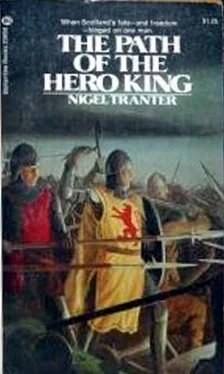Vehement characters both, once decision was taken, there were no half-measures.
Nevertheless, as time passed, Bruce recognised danger signals.
He realised that he was becoming dependent on this woman, that not only was her physical presence becoming necessary to him but that her strong and vivid character was of growing influence upon him, upon his plans and his thinking. He was able to tell himself this way lay not only betrayal of Elizabeth but folly, the endangering of his cause. He accepted that it was not Christinas fault, or deliberately caused-at least, he thought not. But the conviction grew upon him that he trod on thin ice. It was time for him to break loose. Despite the onset of November gales, and the implicit assumption that the winter was upon them, when men drew up their ships and laid by their swords until the campaigning season returned, Bruce decided to make a move.
The couriers and spies had meantime been reporting back to Moidart, from many parts-although some there were who never returned. From their news the King was able to piece together a picture of the national situation as a whole. Basically all of Scotland was prostrated under the heavy heels of the English and the Comyn faction, plus those agile men who always looked to the winning side. But this was only a superficial impression. The enemy grip was tighter in some areas than others, just as the underlying Bruce support was stronger, manifesting itself in small revolts, rioting and civil commotion, ambushes of parties of occupying troops, night assaults on isolated garrisons, and the dumb noncooperation of the people. The SouthWest, from Glasgow down to Galloway, centring round Bruces own earldom of Carrick, was the most restive, aided by many small guerilla bands, relics of Wallaces great force, operating from the upland wildernesses of Ettrick, Merrick and Kells. life, where the Church influence was predominant, despite the Primate Lambertons imprisonment in England, also was in a constant turmoil; as was South Angus, and Dundee said to be a hot-bed of revolt. There was significant word, too, from more than one source, of rifts between the Comyns and their English overlords, with actual fighting in Badenoch. The Bishop of Moray was reported to be recruiting men and ships in the Orkneys. The picture, overall, was of a nation defeated and held down but not subdued, seedling with unrest-no satisfactory prospect for King Edward. A small surge of hope was renewed within the Bruce.
There was no further news, as yet, about the Queen or Marjory or of the other women in Edwards grasp.
While all this was encouraging in some measure, there was no blinking
the one great ominous shadow-the Plantagenets continued presence at
the Border. Rumour had it he was sick again-but still refusing to go
south to the comforts of home life in London. Which could only mean
his utter determination to destroy Scotland once and for all, and Bruce
with it, in the coming season, once the days were long enough for
effective warfare, the hill passes open for his heavy chivalry, and the
coastal seas calm enough for his supply fleets. In 1303 he had let
loose quarter of a million troops on Scotland. His present prolonged
preparations probably meant an onslaught on a similar scale-and this
time upon a prostrate foe and undefended land.
Anything Bruce could do, therefore, it became evident, must be attempted before the spring, while he still had men who might rue for him throughout the country-for nothing seemed more certain than that afterwards there would be no more such alive. Which surely meant that he should not be lying in idle dalliance at Castle Tioram, winter or no winter. Could he even make winter fight for him?
One maddening aspect of the situation was to be surrounded by fighting-men, in these Highlands and Isles, who would not fight for him. Or, at least, who would not unless their chiefs told them to.
And what had he, Bruce, to offer the said chiefs-who looked on the Lowland Scots much as they looked on the English, and certainly accepted no sort of allegiance, or duty to support them. Offers of position and privilege, as reward, in the freed Scotland, should it ever be free again, would have little relevance. Yet these great numbers of fierce fighters were available. Angus Og indeed, like lesser chiefs, built much of the Isles economy on the hiring out his broadswords by the thousand, mainly to the ever warring Irish princelings-as he was doing, and leading them in person, at this present. Bruce undoubtedly could hire them likewise -had he the wherewithal. But today, he had not two gold pieces to rub together.
Yet, apart from the empty Scots treasury, altogether, he was, in theory, one of the richest lords in Scotland, owner of vast lands and estates, whole towns, almost provinces. Carrick was his, and rich Annandale; much of Galloway; the lordship of the Garioch, in Aberdeenshire, and many other lesser estates. Moreover he controlled the great earldom of Mar, as guardian of his nephew.
Riches indeed. And it was nearly the Martinmas Term, when the rents of all those lands were due to be paid to him. If indeed, most, or many, of his people and tenants and vassals remained loyal to him, even as lord, much less king, and if they would probably rise and shed their blood for him-as they had done in the past-might they not still pay their rents to him? Even in todays circumstances, and though almost certainly the English invaders would be mulcting them as well? It was worth a trial. He could send out rent-collectors, at least.
Then there was the position of his two remaining younger brothers to consider, Thomas and Alexander. Apparently the enemy had not managed to lay hands on them, and the rumour was that they were in hiding somewhere in Galloway, instigating much of the insurrection there. Alex was now a priest, in name at least pean of Glasgow, though barely twenty-five. Thomas, a year older, and long-headed, had been the stay-at-home of the family, content to manage the great Annandale estates. They should be found, and brought here to the Isles.
So Bruce borrowed a small galley from Christina, and sent his brother Edward, and with Sir Robert Boyd and Sir Robert Fleming, a Galloway man, to aid and also possibly to restrain him. They were to sail secretly to Galloway, seek out Thomas and Alex, then try to collect as much of the Annandale and Carrick rents as they might, and return to Moidart. He would meet them here again, God willing, for Yuletide.
For he himself was for the sea again, also. In Angus Ogs lent galley, he would continue on his northwards travels, interview the northern chiefs, seeking men and support, avoiding the Ross lands.
And on round the top of Scotland to the Orkney Isles, to link up with the good Bishop David of Moray, there to draw up mutual plans. He hoped that when he returned to Castle Tioram, at Yuletide if possible, it would be in shape to take the first steps towards regaining his throne.
None knew better than he how many, how weary and how long continued those steps must be. But at least a start would be made.
Chapter Six
After the spacious timber halls, the snug comforts, and much Yuletide feasting of Christinas hospitable house-to say nothing of her persons liberality-the small stone chambers of Kildonans keep were bare, cramped and draughty, with the chill February wind finding its way in through a host of cracks and crevices. The crash of waves from far below was a muted thunder, as background for the whistle of the wind and the rattle of the timber shuttering of the small windows ominous indication of the seas running in even these comparatively sheltered waters of the Firth of Clyde, and scarcely propitious sailing weather. But Robert Bruce and his friends were used to storms and high seas, these days, seasoned mariners. After the Sea of the Hebrides, the Minches in midwinter, and rounding Cape Wrath into and out from the dreaded Pentland Firth between Scotland and Orkney, these Arran waters held little terror.
Читать дальше












